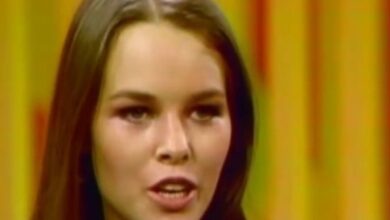Shelley Fabares Offered a Tender and Nostalgic Rendition of “Johnny Angel”
In the early 1960s, the American music scene was graced by a charming tune that captured countless hearts: “Johnny Angel.” Performed by Shelley Fabares, the song tells the story of a teenage girl’s unrequited love—a theme that resonated deeply with the youth of the era. Its catchy melody and relatable lyrics made it an instant favorite, securing its place in pop culture history.
Shelley Fabares, born Michele Ann Marie Fabares on January 19, 1944, in Santa Monica, California, was no stranger to the entertainment industry. Before her musical debut, she had already gained fame as an actress, most notably portraying Mary Stone on the popular television series “The Donna Reed Show.” Her role as the wholesome daughter endeared her to audiences nationwide.
The transition from actress to singer was a natural progression for Fabares. Capitalizing on her television popularity, she ventured into the music world. “Johnny Angel” was released in 1962, marking her debut as a recording artist. The song’s success was unprecedented, especially given that Fabares had not previously pursued a singing career.
“Johnny Angel” quickly climbed the charts, reaching the coveted number one spot on the Billboard Hot 100 in April 1962. Its 15-week stay on the chart was a testament to its widespread appeal. The song’s success was not confined to the United States—it also topped charts in Canada and New Zealand, showcasing its international reach.
The song’s narrative centers on a young girl’s infatuation with a boy named Johnny, who remains unaware of her feelings. This storyline struck a chord with many teenagers of the time, reflecting the innocent crushes and unspoken affections common in adolescent life. The relatable theme, combined with Fabares’ sincere delivery, made “Johnny Angel” a timeless classic.
Behind the scenes, the song benefited from the contributions of talented musicians. Most notably, Darlene Love and her group, The Blossoms, provided the harmonious backup vocals that added depth to the track. Their involvement elevated the song’s quality, giving it a rich, layered sound that perfectly complemented Fabares’ lead vocals.
Despite the monumental success of “Johnny Angel,” Fabares’ singing career was relatively brief. She released a follow-up single, “Johnny Loves Me,” which served as a sequel and narrated how the protagonist eventually wins Johnny’s heart. While it achieved moderate success, it never reached the same heights as its predecessor.
Fabares eventually returned to her acting roots, continuing to build an impressive portfolio. She appeared in several films alongside Elvis Presley, including “Girl Happy” (1965), “Spinout” (1966), and “Clambake” (1967). These roles further showcased her versatility and solidified her status in Hollywood.
The impact of “Johnny Angel” on the music industry was undeniable. It exemplified the trend of television stars crossing over into music, a phenomenon that became increasingly common during that era. The song’s success demonstrated the potential for actors to diversify their talents and achieve acclaim in multiple entertainment fields.
Over the decades, “Johnny Angel” has maintained its charm, continuing to be a staple on oldies radio stations. Its enduring popularity speaks to its universal themes and the nostalgic feelings it evokes. Even today, listeners are transported back to a simpler time, reminded of youthful innocence and the pangs of first love.
Shelley Fabares’ rendition of “Johnny Angel” remains a cultural touchstone. It encapsulates the early 1960s spirit, blending heartfelt storytelling with melodic simplicity. The song’s legacy endures, reminding us of the timeless nature of music and its ability to capture the essence of human emotion.
In retrospect, “Johnny Angel” was more than just a hit single; it was a cultural phenomenon that left an indelible mark on the music landscape. Shelley Fabares’ heartfelt performance and the song’s relatable narrative continue to resonate, ensuring its place in the annals of pop music history.
As we listen to “Johnny Angel” today, we are reminded of its simplicity and sincerity. It stands as a testament to an era when music told straightforward stories that touched the heart. Shelley Fabares’ contribution to this legacy is undeniable, and her performance continues to inspire and delight listeners across generations.





